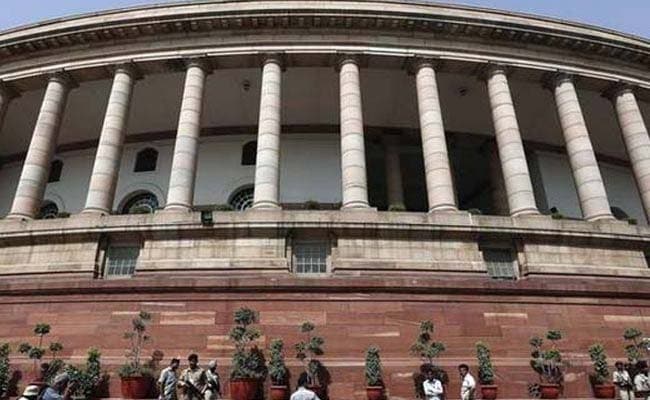
The Bill seeks to create commercial divisions and commercial appellate divisions in high courts, and commercial courts at the district level. (Photo: Parliament of India)
New Delhi:
The Lok Sabha on Wednesday passed the Commercial Courts, Commercial Division and Commercial Appellate Division of High Courts Bill, 2015, by a voice vote.
The Bill seeks to create commercial divisions and commercial appellate divisions in high courts, and commercial courts at the district level.
It was introduced in the Lok Sabha on December 7 by Law and Justice Minister DV Sadananda Gowda.
Replying to a debate on the Bill that stretched over three hours, the minister said it has been brought forth to ensure speedy justice in commercial matters.
"To say that it has been brought in to favour the rich is not right; the bill does not violate any article of the constitution," Mr Gowda said.
The minister denied charges during the debate that the government had done nothing to reduce pendency of cases in various courts of the country.
"It's not true. The government has taken several steps to reduce pendency of cases in courts and to ensure speedy disposal of pending cases," he said.
In the bill, a commercial dispute is defined to include any dispute related to transactions between merchants, bankers, financiers and traders etc. Such transactions deal with mercantile documents, partnership agreements and intellectual property rights etc.
The specified value of a commercial dispute that will be dealt with by commercial divisions in high courts and commercial courts will be an amount not below Rs.1 crore, and will be specified by the central government.
According to the bill, the state governments may set up commercial courts, equivalent to district courts, after consulting their respective high courts.
However, a commercial court must not be set up in an area where the high court exercises ordinary original civil jurisdiction.
Commercial divisions may be set up in those high courts which exercise ordinary original civil jurisdiction, that is, the high courts of Delhi, Bombay, Calcutta, Madras and Himachal Pradesh. They will be set up by the chief justice of that particular high court.
Whereas the commercial appellate divisions may be set up in all high courts to hear appeals against: orders of commercial divisions of high courts, orders of commercial courts and appeals arising from domestic and international arbitration matters that are filed before the high courts.
Such commercial appellate divisions in high courts will be set up by the chief justice concerned.
Judges of commercial courts will be appointed by the state governments after consultations with the concerned high court chief justice. These appointments would be from the higher judicial service cadre in the state, and having experience in dealing with commercial disputes.
The chief justice concerned will nominate judges with experience in commercial matters for commercial and appellate divisions of that high court.
The commercial divisions will comprise of one or more benches consisting of a single judge.
The Bill seeks to create commercial divisions and commercial appellate divisions in high courts, and commercial courts at the district level.
It was introduced in the Lok Sabha on December 7 by Law and Justice Minister DV Sadananda Gowda.
Replying to a debate on the Bill that stretched over three hours, the minister said it has been brought forth to ensure speedy justice in commercial matters.
"To say that it has been brought in to favour the rich is not right; the bill does not violate any article of the constitution," Mr Gowda said.
The minister denied charges during the debate that the government had done nothing to reduce pendency of cases in various courts of the country.
"It's not true. The government has taken several steps to reduce pendency of cases in courts and to ensure speedy disposal of pending cases," he said.
In the bill, a commercial dispute is defined to include any dispute related to transactions between merchants, bankers, financiers and traders etc. Such transactions deal with mercantile documents, partnership agreements and intellectual property rights etc.
The specified value of a commercial dispute that will be dealt with by commercial divisions in high courts and commercial courts will be an amount not below Rs.1 crore, and will be specified by the central government.
According to the bill, the state governments may set up commercial courts, equivalent to district courts, after consulting their respective high courts.
However, a commercial court must not be set up in an area where the high court exercises ordinary original civil jurisdiction.
Commercial divisions may be set up in those high courts which exercise ordinary original civil jurisdiction, that is, the high courts of Delhi, Bombay, Calcutta, Madras and Himachal Pradesh. They will be set up by the chief justice of that particular high court.
Whereas the commercial appellate divisions may be set up in all high courts to hear appeals against: orders of commercial divisions of high courts, orders of commercial courts and appeals arising from domestic and international arbitration matters that are filed before the high courts.
Such commercial appellate divisions in high courts will be set up by the chief justice concerned.
Judges of commercial courts will be appointed by the state governments after consultations with the concerned high court chief justice. These appointments would be from the higher judicial service cadre in the state, and having experience in dealing with commercial disputes.
The chief justice concerned will nominate judges with experience in commercial matters for commercial and appellate divisions of that high court.
The commercial divisions will comprise of one or more benches consisting of a single judge.
Track Latest News Live on NDTV.com and get news updates from India and around the world

